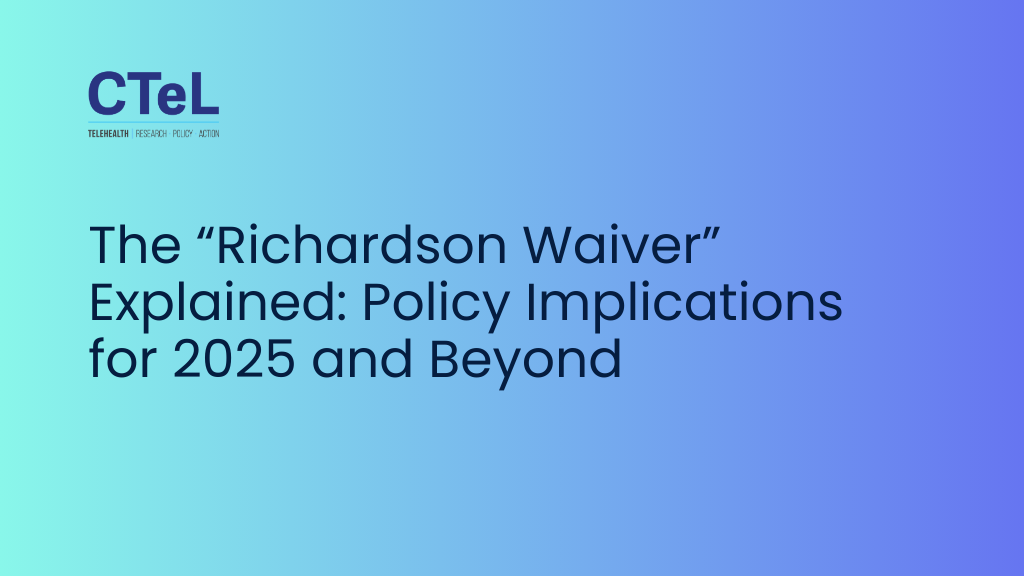The “Richardson Waiver” Explained: Policy Implications for 2025 and Beyond
On March 3rd, 2025, Health and Human Services (HHS) Secretary Robert F. Kennedy Jr. published a policy statement directing the agency to no longer require standard federal regulatory rulemaking procedures for matters “relating to agency management or personnel or to public property, loans, grants, benefits, or contracts.” Notably, this gives the agency opportunity to forego issuing public comment opportunities for certain administrative actions.
The “Richardson Waiver”
In 1971, HHS issued a policy statement titled “Public Participation in Rule Making.” This policy directed the agency to use standard notice of proposed rulemaking procedures in instances not required by law, including matters pertaining to “agency management” and “public property, loans, grants, benefits, or contracts.” These procedures are codified by the Administrative Procedure Act (APA), which governs the process for most rules issued by Administration agencies and allowed for exemptions for agency actions under the listed categories.
In issuing the waiver, HHS cited a 1969 recommendation from the Administrative Conference of the United States, and a desire to see “greater participation by the public in the formulation of this Department’s rules and regulations.” This waiver has since been referred to as the “Richardson Waiver,” named after then-HHS Secretary Elliot L. Richardson, appointed by President Richard Nixon. There has been a decades-long effort to repeal this exemption, including a 2016 position statement by the American Bar Association.
Analysis of APA Exceptions
The Richardson Waiver (and Secretary Kennedy’s subsequent repeal) cover agency activities often considered as “’proprietary functions,’ i.e., government control over its own resources.” These are distinct from agencies acting as regulators of other entities’ activities. There are several key court cases that help illuminate these exemptions:
Agency Management: This exception only applies to agency management decisions that only affect the agency in question. This includes documents like employee handbooks and training materials.
Stewart v. Smith, 673 F.2d 485 (D.C. Cir. 1982): “a rule may not be characterized as one of "management" or "personnel" if it has a substantial effect on persons outside the agency.”
Also see Hamlet v. U.S., 63 F.3d 1097 (Fed. Cir. 1995).
Public Property: This does not pertain to any rulemaking concerning public lands – only those concerning the “distribution of public property.”
City of Santa Clara, Cal. v. Andrus, 572 F.2d 660 (9th Cir. 1978): “While some may deplore this state of affairs, the rule making section of the APA, § 553, manifests a clear legislative intent to permit ad hoc decision making in the distribution of public property.”
The 2025 Repeal: What to Expect
In the policy statement repealing the Waiver, Secretary Kennedy says that it “imposes costs on the Department and the public, are contrary to the efficient operation of the Department, and impede the Department's flexibility to adapt quickly to legal and policy mandates.” It is important to note that the statement still allows agencies to “have discretion to apply notice and comment procedures to these matters but are not required to do so, except as otherwise required by law” – it is not a blanket ban on comment opportunities. Additionally, the statement affirms that HHS “will continue to follow notice and comment rulemaking procedures in all instances in which it is required to do so by the statutory text of the APA.”
Secretary Kennedy says that it “imposes costs on the Department and the public, are contrary to the efficient operation of the Department, and impede the Department's flexibility to adapt quickly to legal and policy mandates.”
The Trump Administration during his first term in office reaffirmed its support for the Richardson Waiver in an HHS policy statement issued in 2020. Courts have also historically held HHS to the waiver; recent lawsuits against the Agency’s cutting of NIH research funding, such as Commonwealth of Massachusetts v. National Institutes of Health, cite the Richardson Waiver as a requirement the agency should have followed. The 2025 repeal of the waiver represents a significant policy departure both for HHS, which oversees trillions of dollars in public spending, and the Trump Administration.
Despite the 2025 policy giving the Agency discretion to continue allowing comment opportunities, there are some rules and policies that may be impacted, including:
Matters related to HHS grantmaking and methodology, such as through the National Institutes of Health, Centers for Disease Control and Prevention, Administration for Children & Families, Agency for Healthcare Research and Quality, and other programs. HHS is the largest grant-making agency in the US and provides grants to state, local, and tribal governments and community organizations.
Eligibility criteria for benefits administered by the agency like Medicaid, Children’s Health Insurance Program (CHIP), and the Supplemental Nutrition Assistance Program (SNAP).
Contracts administered by HHS, such as those for the procurement of devices like ventilators.
Other areas will likely not see a change in procedure:
Medicare physician fee schedule (PFS), outpatient prospective payment system (OPPS), and other payment regulations issued on a yearly basis.
National coverage determinations issued by CMS, which are required under Section 1862(l)(3) of the Social Security Act.
Major rulemaking activities mandated by the APA, such as those deemed economically significant and other standard “notice and comment” rules.
Loan repayment programs, such as National Health Service Corps, Nurse Corps, Indian Health Service, and Pediatric Specialty loan repayment programs.
This waiver repeal may also impact future litigation against HHS. Public comments often assist agencies in identifying legal concerns before regulations are finalized. Agencies also point to public comment opportunities when defending their activities in court. CTeL will continue to monitor Administration activities and provide members with opportunities to contribute to comments on federal rulemaking.

